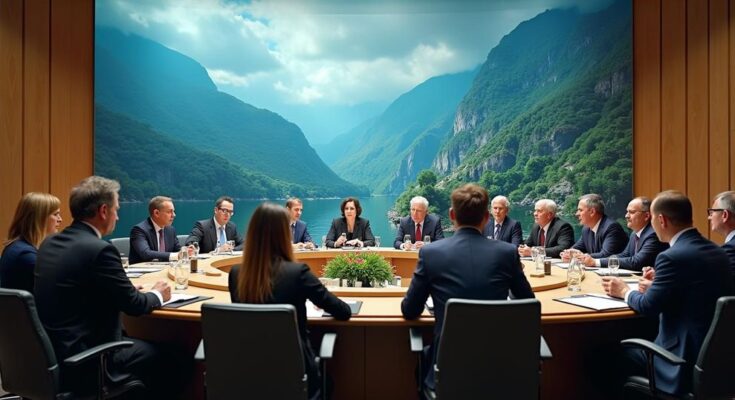Leaders at COP29 in Azerbaijan are aiming for climate finance commitments in the “hundreds of billions” rather than trillions as a realistic consensus. This summit seeks to replace the current $100 billion annual support for developing nations, amid growing climate crises signaling an urgent need for greater financial investment in global warming mitigation strategies.
The leaders attending the forthcoming COP29 United Nations climate summit in Azerbaijan have acknowledged the urgent need for climate change financing, suggesting that while trillions of dollars are necessary to combat climate change and its effects, a tangible financing target that could achieve consensus may realistically land in the “hundreds of billions”. This pivotal summit seeks to establish a new financial goal to supersede the existing commitment from wealthier nations to allocate $100 billion annually to assist developing nations with climate adaptation and mitigation measures. Yalchin Rafiyev, the chief negotiator for the COP29 presidency, highlighted that, although the overall need is acknowledged as trillions, the practical funding that the public sector might mobilize still falls within the hundreds of billions range. The acknowledgment of this funding requirement comes against a backdrop of increasing climate-related disasters—such as severe hurricanes and extreme temperatures—impacting developing nations particularly hard. These countries assert that enhanced financial support is essential for them to effectively respond to climate change, thereby enabling investments in renewable energy solutions and other initiatives to reduce their own emissions. As global temperatures have surged approximately 1.3 degrees Celsius above pre-industrial levels, and with 2024 potentially set to become the hottest year recorded, scientists warn that reaching the goal of limiting global warming to 1.5 degrees Celsius is increasingly precarious without expedited and increased efforts. The upcoming negotiations are expected to draw participation from over 100 global leaders, including 61 presidents, 38 prime ministers, and two crown princes, as indicated by COP29 authorities. This attendance is markedly lower than the 160+ leaders present at last year’s climate summit in Dubai, suggesting varying levels of international commitment. COP29 President-Designate Mukhtar Babayev stated, “We have done well to narrow down options, and the possible shapes of landing zones are coming into view. But we can clearly see the divides that the Parties still need to bridge.” Furthermore, Azerbaijan’s President Ilham Aliyev emphasized a collaborative approach by urging nations to unite rather than dwell on past grievances regarding responsibility for climate change: “While states have common but differentiated responsibilities, they should put aside disagreements, stop blaming each other and find common ground. We cannot afford to waste time on defining who is guilty for global warming, or who caused more environmental harm.”
As climate change continues to escalate, the necessity for substantial financial resources to mitigate its adverse effects has gained prominence on the global agenda. The COP29 summit represents a crucial moment for the international community to reassess and amplify its funding commitments to developing nations, who face the brunt of climate-induced challenges without adequate financial backing. The transition from annual financial commitments to significant funding goals is indicative of a broader understanding of the magnitude of climate change impacts and the need for urgent and cooperative international responses.
In summary, while the overall financing need to tackle climate change is vast and estimated in the trillions, COP29 leaders have set a more pragmatic expectation for financing levels. The focus now is to establish realistic financial commitments that can support developing nations in their climate resilience and adaptation efforts. The upcoming negotiations aim to unify global leaders around common goals, particularly in light of escalating climate disasters and the pressing need to limit global temperature increases.
Original Source: wtvbam.com




